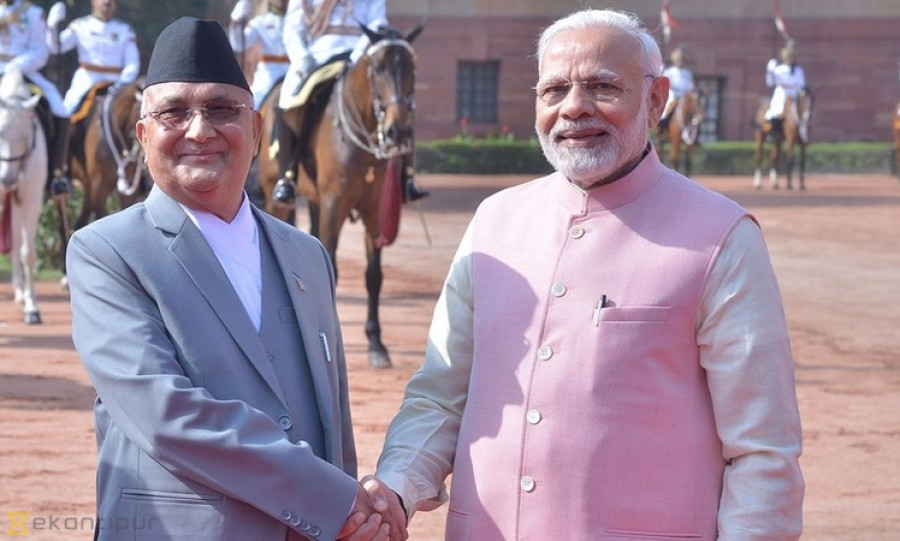Opinion
What Modi means to Nepal
There could be an increase in Indian investment in the country’s hydroelectric sector.
Shankar Man Singh
Some opine that the victory of the Bharatiya Janata Party in the Indian general election means there will be regional stability in the region when we talk about the South Asian Association for Regional Cooperation, Bay of Bengal Initiative for Multi-Sectoral Technical and Economic Cooperation and the Bangladesh, Bhutan, India and Nepal initiative. But Nepal will not directly benefit from this activity. If Nepal cannot prove that it is the best investment destination, capital and investment might fly to India. In Nepal, the development of a conducive environment for infrastructure development is still a pipedream, and doing business is not faring well either. Even domestic investors are not satisfied, not to mention foreign investors.
Some are of the view that the Indian election result will have minimal effect on the Nepali economy. Due to India’s high growth rate, the spillover effect might be positive for Nepal’s overall development. In the context of attracting foreign direct investment, India is not a competitor for Nepal as much of the investment is destined for the hydro and the service sectors rather than the manufacturing sector. The elections in neighbouring India matter to the government and people of Nepal. While the government of Indian Prime Minister Narendra Modi in New Delhi started its relations with Kathmandu on a high note, the ties are back to less-than-satisfactory levels at the end of his five-year term.
A cursory review of history clearly shows that Nepal-India relations observed several hitches after Nepal promulgated the constitution in 2015. This was followed by a long, painful economic blockade imposed on Nepal by India allegedly for not incorporating New Delhi’s concerns in its constitution. A year later, some discomfort was seen in Nepal due to the demonetisation of Indian Rs500 and Rs1,000 banknotes. People in Nepal lost huge sums of money due to lack of exchange facilities within the country. Despite India’s promises, the Reserve Bank of India failed to resolve the issue with its Nepali counterpart, Nepal Rastra Bank.
The first job of the Prime Minister Modi who has been elected yet again will be to receive a report prepared by the Nepal-India Eminent Persons’ Group last year. The group, formed in 2016 to produce a comprehensive report on how to settle issues related to bilateral relations, completed its report in July 2018. It comprises expert’s views and not enforceable. Since Modi first came to power in 2014, the nationalist prime minister has visited Nepal four times, seemingly in line with his much-publicised neighbourhood first policy. There is also the future of the 19th summit of the South Asian Association for Regional Cooperation, given escalating tensions between India and Pakistan. Looking back at the five years of Nepal-India relations during the Modi regime, Modi made the first visit by an Indian premier in over 17 years. In 1997, the then prime minister IK Gujral had visited Nepal.
No two neighbouring countries enjoy a more intimate and complex relationship than India and Nepal.
There is hope for generosity from India to send a message that the international image of India, which is advancing toward becoming a super power, can be boosted only through stability and development in the neighbourhood. But Nepal must be able to do the necessary homework and put its issues clearly for that to happen. Since Modi was re-elected prime minister by championing the agenda of economic prosperity, development and employment, this can have a very positive impact on neighbouring countries like Nepal which shares an open border with India.
Experts argue that since many top leaders of the Bharatiya Janata Party are known faces to Nepal, the political leadership here should make efforts to reap the benefits. Our leadership has to make efforts to win the goodwill of the known leaders in India to help address the problems that Nepal faces in the area of increasing merchandise exports, boosting infrastructure development, and addressing marketing constraints in trade. Nepal should seek assistance for setting up and accelerating the process of Special Economic Zones.
Nepal needs to broadly utilise the economic and trade opportunities available in India, but it has not been able to do so due to problems like energy shortage, weak productive capacity, inadequate infrastructure, low foreign direct investment, inefficient trade facilitation infrastructure including complex rules and regulations, absence of an accreditation board, and low margins of preference.
During the 2014 election campaign, Modi had said that India’s neighbourhood policy should be based on mutual benefit, common prosperity and stability. While campaigning in Uttar Pradesh and Bihar states, he had advocated tapping Nepal’s huge hydropower potential for mutual benefit. Such statements point to a possible surge in Indian investment in Nepal’s hydroelectric sector. For this, we’ll have to keep our house in order and ensure a coherent policy towards investment from foreign countries, including India.
Singh holds an MBA from the Delhi School of Economics.




 14.07°C Kathmandu
14.07°C Kathmandu










